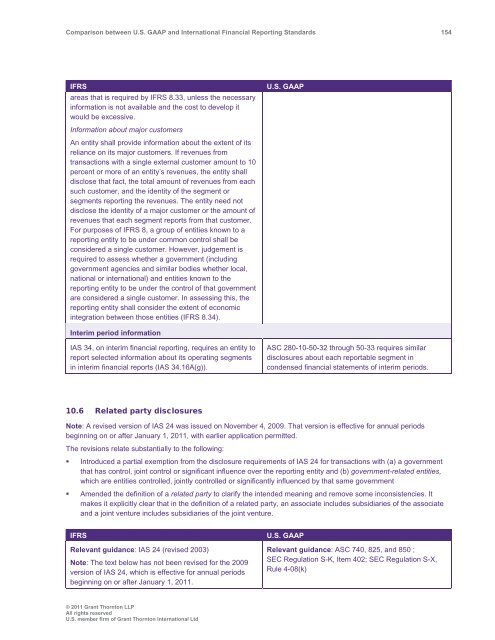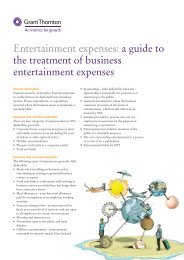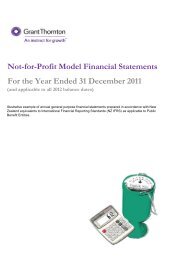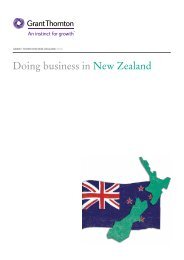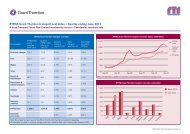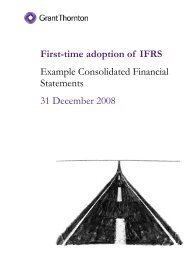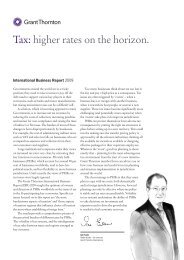Comparison between U.S. GAAP and International ... - Grant Thornton
Comparison between U.S. GAAP and International ... - Grant Thornton
Comparison between U.S. GAAP and International ... - Grant Thornton
Create successful ePaper yourself
Turn your PDF publications into a flip-book with our unique Google optimized e-Paper software.
<strong>Comparison</strong> <strong>between</strong> U.S. <strong>GAAP</strong> <strong>and</strong> <strong>International</strong> Financial Reporting St<strong>and</strong>ards 154<br />
IFRS<br />
areas that is required by IFRS 8.33, unless the necessary<br />
information is not available <strong>and</strong> the cost to develop it<br />
would be excessive.<br />
Information about major customers<br />
An entity shall provide information about the extent of its<br />
reliance on its major customers. If revenues from<br />
transactions with a single external customer amount to 10<br />
percent or more of an entity’s revenues, the entity shall<br />
disclose that fact, the total amount of revenues from each<br />
such customer, <strong>and</strong> the identity of the segment or<br />
segments reporting the revenues. The entity need not<br />
disclose the identity of a major customer or the amount of<br />
revenues that each segment reports from that customer.<br />
For purposes of IFRS 8, a group of entities known to a<br />
reporting entity to be under common control shall be<br />
considered a single customer. However, judgement is<br />
required to assess whether a government (including<br />
government agencies <strong>and</strong> similar bodies whether local,<br />
national or international) <strong>and</strong> entities known to the<br />
reporting entity to be under the control of that government<br />
are considered a single customer. In assessing this, the<br />
reporting entity shall consider the extent of economic<br />
integration <strong>between</strong> those entities (IFRS 8.34).<br />
U.S. <strong>GAAP</strong><br />
Interim period information<br />
IAS 34, on interim financial reporting, requires an entity to<br />
report selected information about its operating segments<br />
in interim financial reports (IAS 34.16A(g)).<br />
ASC 280-10-50-32 through 50-33 requires similar<br />
disclosures about each reportable segment in<br />
condensed financial statements of interim periods.<br />
10.6 Related party disclosures<br />
Note: A revised version of IAS 24 was issued on November 4, 2009. That version is effective for annual periods<br />
beginning on or after January 1, 2011, with earlier application permitted.<br />
The revisions relate substantially to the following:<br />
• Introduced a partial exemption from the disclosure requirements of IAS 24 for transactions with (a) a government<br />
that has control, joint control or significant influence over the reporting entity <strong>and</strong> (b) government-related entities,<br />
which are entities controlled, jointly controlled or significantly influenced by that same government<br />
• Amended the definition of a related party to clarify the intended meaning <strong>and</strong> remove some inconsistencies. It<br />
makes it explicitly clear that in the definition of a related party, an associate includes subsidiaries of the associate<br />
<strong>and</strong> a joint venture includes subsidiaries of the joint venture.<br />
IFRS<br />
Relevant guidance: IAS 24 (revised 2003)<br />
Note: The text below has not been revised for the 2009<br />
version of IAS 24, which is effective for annual periods<br />
beginning on or after January 1, 2011.<br />
U.S. <strong>GAAP</strong><br />
Relevant guidance: ASC 740, 825, <strong>and</strong> 850 ;<br />
SEC Regulation S-K, Item 402; SEC Regulation S-X,<br />
Rule 4-08(k)<br />
© 2011 <strong>Grant</strong> <strong>Thornton</strong> LLP<br />
All rights reserved<br />
U.S. member firm of <strong>Grant</strong> <strong>Thornton</strong> <strong>International</strong> Ltd


